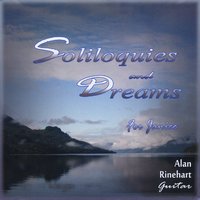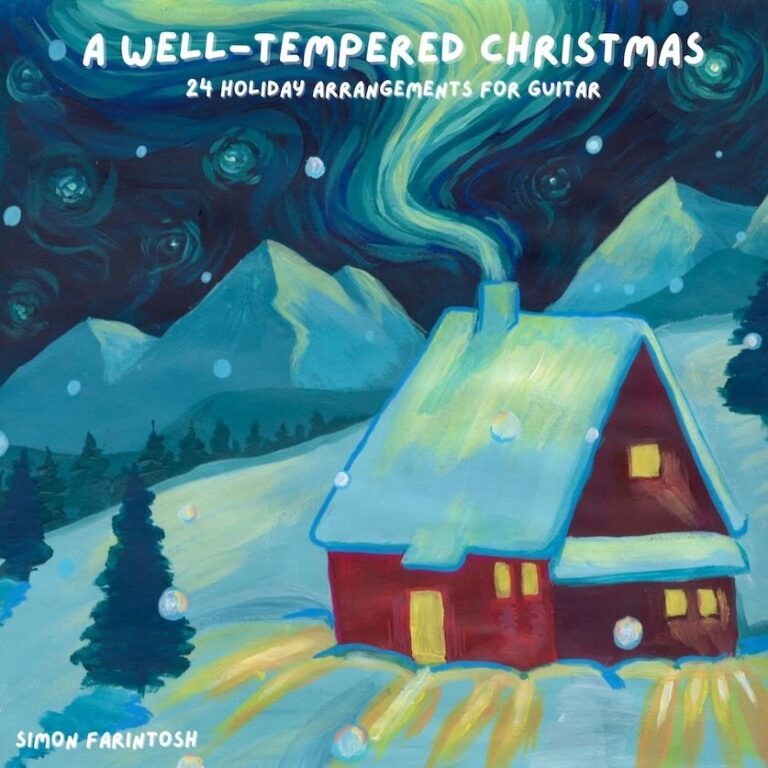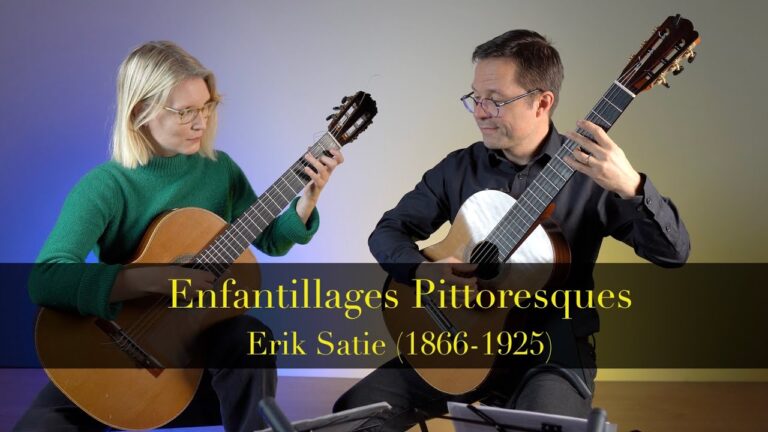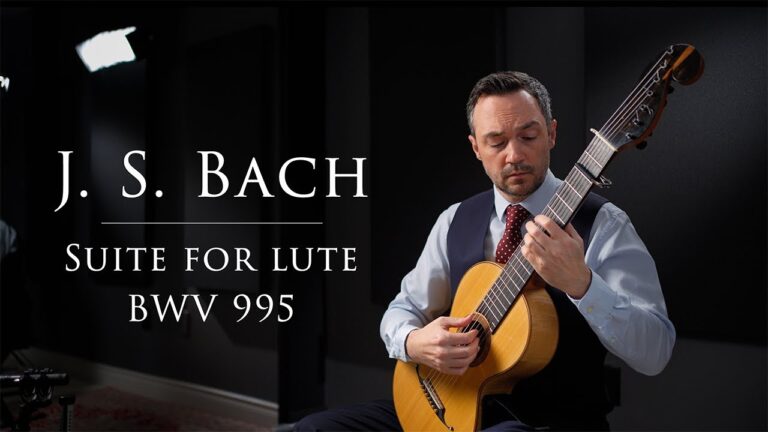Soliloquies and Dreams (For Janice)
Artist website: Alan Rinehart
Album Programme Notes and samples
NovaScribe Editions / Alan Rinehart, 2014.
Buy the Album via Amazon: Soliloquies and Dreams
I’ve had the plesure of meeting Canadian guitarist Alan Rinehart on a number of occasions but most memorably in my hometown, Nelson, BC, where Alan hosted the Northwest Guitar Festival in 2009. He now resides in the town of Kelowna, in the Okanagan region of British Columbia. Soliloquies and Dreams (For Janice) is Alan’s fourth studio recording and is packed with a large amount of repertoire as well as a new work by David Gordon Duke written for Rinehart. Check out the interview for more information about the album as well other info on recording, wine, and advice for student guitarists! I really like the down-to-Earth discussions below so a big thank you to Alan for being so generous with his answers!
Interview with Alan Rinehart
By Bradford Werner via email, Sept 2014.
Bradford Werner: Soliloquies and Dreams is your fourth solo album, can you tell us a bit about your recording process, the technology, and your preparation?
Alan Rinehart: For starters, I’d like to declare that I am a reluctant recording studio guy. My inclination has always been more toward the immediacy, direct communication and temporality of performing. Recording had a certain tenseness for me, even though the possibility of redoing something was always there. I’m sure that had something to do with the relative infrequency of situations where I found myself behind a mic and the fact that I don’t like listening to my own playing, it’s a bit like watching videos of yourself! My professional recording history runs something like this: CBC once or twice a year (starting in 1976), first album in 1981, occasional recorded concert, radio/TV and CBC, second album 2000, more CBC with the Vancouver Guitar Quartet, third CD 2010, fourth 2013/14. I have a fifth almost finished and plans for several more over the next couple of years, so, since 2010 I’ve obviously become much more comfortable with the process of recording.
The fact that a recording is a fixed entity means, for me, getting into a different mind set. I remember a conversation between Yehudi Menuhin and Glenn Gould on the TV series ‘The Music of Man’ where they were discussing the future of performing vs. recording and how Gould argued for the recording being able to represent an ideal performance/interpretation. That is how I try to approach a recording, more as an ideal performance. Preparing a piece for recording is very different for me. Apart from the standard fingering and articulation choices you have to be hyper-aware of tuning and tone as well as little noises that would not affect a performance but would mar a recording take. I’ll record myself playing an entire piece and then go back and work through phrases until I’m satisfied that the final ‘cut’ is what I want. Digital editing makes that process so much easier than the days of tape! I do all my own editing and then send the raw file out for processing and mastering. Currently I record at home in 16 bit using a combination of a Rode and an Audio Technica mike.
BW: How did the title composition by David Gordon Duke come about?
AR: David and I have crossed musical paths for decades. I premiered his ‘Dalza’ work at the Victoria Art Gallery in 1977 when I was commuting from Vancouver to teach at the Victoria Conservatory for a time in the 70’s and later we were colleagues at Vancouver Community College during my stint there. He wrote Soliloquies and Dreams the year before my wife and I moved to Nelson. We talked many times about his writing a work for me but it wasn’t an official commission so I am very grateful for his dedicating it to me. With all the busyness of moving etc. I didn’t have the chance to devote time to working with David until quite a bit later although I really wanted to perform and record the work. When the idea for the CD evolved, his work seemed a perfect choice for the program.
BW: I believe this is Duke’s third composition that includes guitar, what does he explore in this work both from a compositional standpoint and from the guitar?
AR: I would never presume to speak to David’s compositional process but I do know from our conversations that he is very drawn to the expression and colour possibilities that the guitar offers, as exemplified by Britten’s Nocturnal. He has written a bit more guitar music, I’m not sure what number S&D is but he has written ‘three pieces after Dalza’ and a set of Elizabethan songs for voice and guitar as well as a number of works for an earlier edition of the Bridges guitar series for the Royal Conservatory.
BW: How did you choose the varied works on this album and why?
AR: The whole idea for the recording started after completing my CD ‘The Golden Century’ in 2010. Spending the better part of a year in near total immersion in the very particular musical world of 16th century Italian lute repertoire was very rewarding. I love the music and the near spiritual space it puts you into but I felt the need to go elsewhere for a while musically! Soliloquies and Dreams is sub-titled ‘for Janice’ for my wife because she gave me the initial idea for the recording. When you live with a musician you hear a lot of music around the house! Over time a collection of ‘that’s nice’ music turned into the beginning of a CD program. We both tend toward a contemplative or even introspective ambience in the music we are drawn to so the underlying theme of the recording became intimate and personal. That’s not to say that I didn’t enjoy including some upbeat and cheerful tracks! I still followed a roughly chronological order to the program. Overall the ambience is of an after hours candlelit soiree rather than a concert hall.
I’d like to say that I feel that it is important to encourage new additions to the repertoire and to include new works on recordings when possible. My next CD will include a suite of pieces based on Janice’s poetry book Dreams Laid Down that I commissioned from California composer Michael Karmon (free downloadable versions of the pieces are now available from my website under publications/downloads). I’m also in the process of recording the solo guitar works of John Oliver including a work I commissioned.
BW: Can you tell us more about the Vancouver Guitar Quartet? I see them referenced often and have seen (and played) some of the music they commissioned for quartet but there is not really a central place to learn about their accomplishments.
AR: I’d like to start by saying that, while I have had many opportunities to do chamber music since the Quartet disbanded in 2003, I have not played in a guitar quartet and I miss it! As you know, it is a challenging but uniquely satisfying experience to perform in a group of kindred spirits that share an intimate affinity and knowledge of one instrument. There is a page on my website that gives a brief account of our work over the years, including a clip from our CD ‘Estampas’ so any interested readers could visit the site.
BW: How’s life up in the Okanagan? Any nice views for practicing?
AR: Here is a pic taken on our deck-I don’t always practice ‘al fresco’. After 32 years in Vancouver I really appreciate the relative lack of traffic! Kelowna and the whole Okanagan is easily accessible to the Coast when we want to visit and there is terrific artistic potential here. I’m an avid golfer and that keeps me quite occupied in the warmer months. Kelowna has been called ‘Palm Springs North’ for good reason.
Our interim 6 year stay in Nelson was great; making good friends, performing regularly, hosting the 19th Northwest Guitar Festival in 2009 and directing a concert series at the Kootenay Gallery in Castlegar, but both my wife and I felt too strong a pull Westward, so it was ‘Kelowna bound’ in 2010.
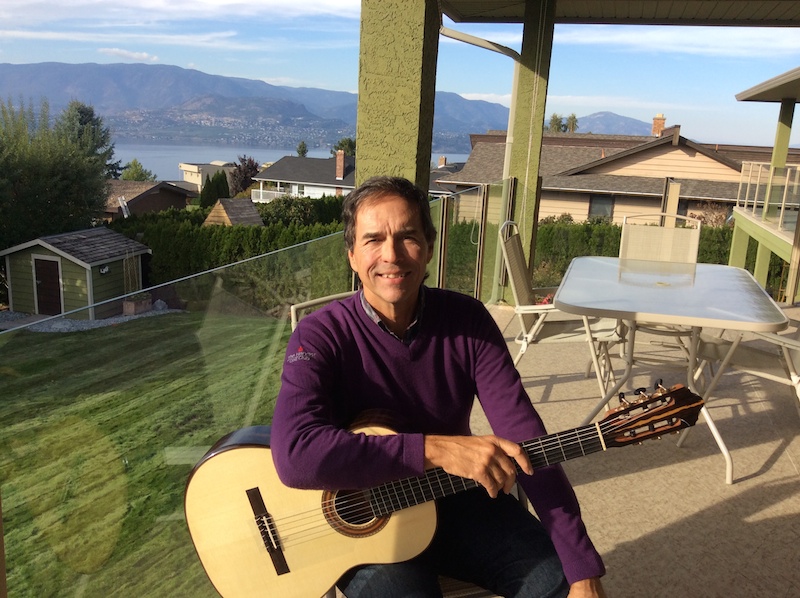
BW: What wine from the Okanagan can you recommend?
AR: I’m a long way from being an oenophile, but I do like a good glass of Merlot after a hard day (or easy day) of doing anything. With four years of Okanagan living under my belt I can say that I do have a couple of favourite wineries.
One is Summerhill Winery, they produce a nice organic wine and use a unique process of aging the wine under a large pyramid! The other is Mission Hill, beside producing an excellent variety of wines, their establishment in West Kelowna is a must visit. Everything about it is of the finest aesthetic and artistic quality. I’m also somewhat partial to the facility because they recently hosted a visit from their Royal Highnesses the Earl and Countess of Wessex and I had the honour of performing for them during the evening!
BW: If you had a word of advice for young guitarists looking to make a career in music what would it be?
AR: This is a very difficult question. We live in a world where information processing, including music, is transforming and reinventing itself almost daily. While the potential audience for one’s playing is larger than it ever has been, finding the best platform to promote your work is very challenging and financial rewards for that work are elusive. Being able to make any kind of regular living as a classical concert artist (outside of orchestral positions) has always been difficult and the days of a solo guitarist ala Segovia or Bream filling a 2000-3000 seat concert hall may be well and truly over but I am still optimistic that there is an audience for live classical music and performers have the happy obligation to share that music with the general public as often as possible. The classical guitar and classical music in general is all but invisible in the general media, our professional survival depends on every classical musician doing what they can to increase exposure to the music we love.
Here are some things that I feel are imperative for all of us, not just those at the beginning of their careers:
- Stay curious, read all the music you can get your hands on, build a broad knowledge of our repertoire.
- Perform often, performing is something that one must practice regularly to become comfortable with. While a student, one should look for open mic nights at cafes or restaurants. Play simple, tuneful and short music. A well played and musical performance of Sor’s Bm etude will be more enchanting to an audience who has never heard a live classical guitarist than a complex and/or virtuostic concert work would be. A relaxed and musical performance will leave people interested and wanting more.
- Remember, as public performers we are ENTERTAINERS. Music has strong healing and uplifting powers: be bold, risky, willing to fail, challenging, but never, never boring.
- Take your rightful place in the broader music world. Play chamber music with other instruments; seek out other instrumentalists or vocalists to work with, especially while at music school.
- Winning a competition or getting ‘papers’ may be an essential step to beginning a career but what sustains a career is building a strong personal voice, not a flawless Bach Chaconne/Sor op.9/etc.
INTERVIEW END
Thanks to Alan for the fantastic interview. Learn more about Alan Rinehart at his website. Also discover and listen to the album at Programme Notes and samples.

